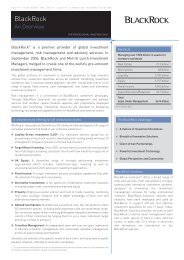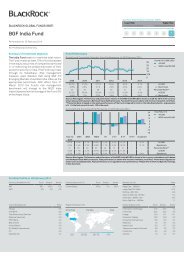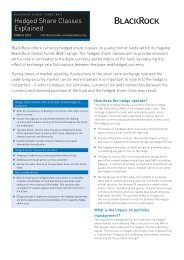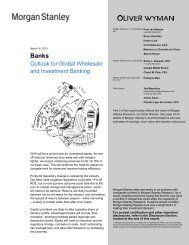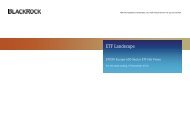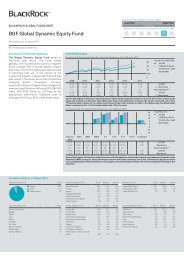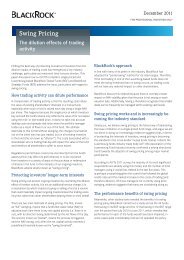Prospectus (4.96 Mb) - BlackRock International
Prospectus (4.96 Mb) - BlackRock International
Prospectus (4.96 Mb) - BlackRock International
You also want an ePaper? Increase the reach of your titles
YUMPU automatically turns print PDFs into web optimized ePapers that Google loves.
esponse to the rules. There can be no assurances that the Company, the Investment Manager, or any External<br />
Investment Advisor or Fund Investment will not in the future be subject to regulatory review or discipline.<br />
SYNTHETIC PARTICIPATION IN ABSOLUTE RETURN STRATEGIES<br />
The Investment Manager may utilise customised derivative instruments, including swaps, options, forwards, notional<br />
principal contracts or other financial instruments, to replicate, modify or replace the economic attributes associated with<br />
a Fund Investment or Direct Investment. The Company may be exposed to certain additional risks should the Investment<br />
Manager use derivatives as a means to synthetically implement the Company’s investment strategies. If the Company<br />
enters into a derivative instrument whereby it agrees to receive the return of a security or financial instrument or a basket<br />
of securities or financial instruments, it typically will contract to receive such returns for a predetermined period of time.<br />
During such period, the Company may not have the ability to increase or decrease its exposure. In addition, such<br />
customised derivative instruments will likely be highly illiquid, and it is possible that the Company will not be able to<br />
terminate such derivative instruments prior to their expiration date or that the penalties associated with such a<br />
termination might impact the Company’s performance in a materially adverse manner. Furthermore, derivative<br />
instruments typically contain provisions giving the counterparty the right to terminate the contract upon the occurrence of<br />
certain events. Such events may include a decline in the value of the reference securities and material violations of the<br />
terms of the contract or the portfolio guidelines as well as other events determined by the counterparty. If a termination<br />
were to occur, the Company’s return could be adversely affected as it would lose the benefit of the indirect exposure to the<br />
reference securities, and it may incur significant termination expenses.<br />
In the event the Company seeks to participate in a Collective Investment Vehicle or other similar Fund Investment through<br />
the use of such synthetic derivative instruments, the Company will not acquire any voting interests or other shareholder<br />
rights that would be acquired with a direct investment in the underlying Fund Investment. Accordingly, the Company will<br />
not participate in matters submitted to a vote of the investors in such Fund Investment. In addition, the Company may not<br />
receive all of the information and reports to investors that the Company would receive with a direct investment in such<br />
Collective Investment Vehicle. Further, the Company will pay the counterparty to any such customised derivative<br />
instrument structuring fees and ongoing transaction fees, which will reduce the investment performance of the Company.<br />
Finally, certain tax aspects of such customised derivative instruments are uncertain and, if the Company’s tax treatment<br />
of such instruments is challenged successfully by tax or other regulatory authorities in the applicable country or<br />
jurisdiction, a Shareholder’s return could be adversely affected. The Company has not obtained any opinion or other advice<br />
with respect to tax consequences in the United States or any other jurisdiction relating to the Company or an investment<br />
therein with respect to such derivative instruments.<br />
Derivative instruments generally also involve counterparty risk, i.e., the risk that the counterparty fails to fulfil its<br />
contractual obligations under the terms of the instrument, and such instrument may not perform in the manner expected<br />
by the counterparties, thereby resulting in greater loss or gain to the investor. The Investment Manager will seek to<br />
minimise the Company’s exposure to counterparty risk by entering into such transactions with counterparties the<br />
Investment Manager believes to be creditworthy at the time it enters into the transaction. Certain transactions in such<br />
derivative instruments may require the Company to provide collateral to secure its performance obligations under a<br />
contract.<br />
RISKS RELATING TO TAXATION<br />
CHANGES IN TAX LAWS OR REGULATION<br />
Changes to the tax laws of, or practice in, Jersey or any other tax jurisdiction affecting the Company or in which it may<br />
invest, including, for example, the imposition of withholding or other taxes on the Company’s investments, could adversely<br />
affect the value of the investments held by the Company and decrease the post-tax returns to Shareholders. Statements in<br />
this Registration Document concerning the taxation of Shareholders are based upon current tax law and practice in the<br />
jurisdictions covered, which law and practice is, in principle, subject to change that could adversely affect the ability of the<br />
Company to meet its investment objective and which could adversely affect the taxation of Shareholders.<br />
CHANGES TO TAX TREATMENT OF DERIVATIVE INSTRUMENTS<br />
The tax environment for derivative instruments is evolving, and changes in the taxation of derivative instruments may<br />
adversely affect the value of derivative instruments held by the Company and its ability to pursue its investment strategies.<br />
In addition, the Company may take positions with respect to certain tax issues which depend on legal conclusions not yet<br />
resolved by the courts. Should any such positions be successfully challenged by an applicable taxing authority, there could<br />
be a material adverse effect on the Company.<br />
CHANGES IN TAX RESIDENCE<br />
If the Company were treated as resident, or as having a permanent establishment, or as otherwise being engaged in a<br />
trade or business, in any country in which it invests or in which its investments are managed, all of its income or gains, or<br />
the part of such gain or income as is attributable to, or effectively connected with, such permanent establishment or trade<br />
or business, may be subject to tax in that country, which could have a material adverse effect on its performance and<br />
returns to Shareholders.<br />
To maintain its non-UK tax resident status, the Company must be managed and controlled outside the United Kingdom.<br />
The composition of the Board of Directors, the place of residence of the Board’s individual members and the location(s) in<br />
24



